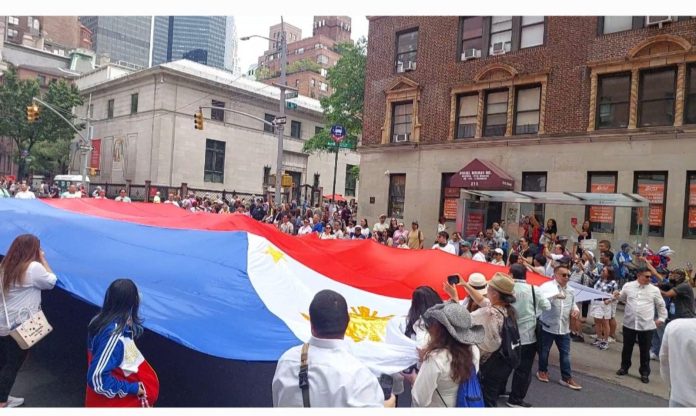New York – A huge Philippine flag, estimated to be 25 by 50 feet, is one of the highlights of the parade in celebration of the 126th Independence Day parade on Madison Avenue in Midtown Manhattan.
Considered as the world’s largest celebration outside Manila, this year’s parade event fell on June 2, 2024 since it is traditionally held on the first Sunday of June.
It was participated in by some 135 floats, organizations, and marching bands, some of which came all the way from the Philippines. down 10 blocks from 38th Street to 27th Street of Madison Avenue with the theme “Preserving Our Filipino Culture and Heritage to Unite Generations”.
Now on its 34th year, it is a major event for many Filipino Americans that aimed to rekindle their roots and heritage and to commemorate the June 1898 Philippine Declaration of Independence from Spain.
According to an ethnogeriatrics study by the Stanford Medicine, citing the 2022 American Community Survey of United States Census Bureau, Filipino Americans (alone or in combination with one or more races) account for merely 1% of the total US population.
However, they are the third largest Asian American group after Chinese and Asian Indian Americans.
Filipino Americans are fairly widely dispersed in the United States. California holds the largest Filipino American settlement, followed by Hawaii, Nevada, Texas, Illinois, New York, New Jersey, Washington State, and Virginia respectively.
The study added that between 1986 and 2006 the number of Filipino immigrants tripled, making them the second largest immigrant group in the US after Mexican immigrants. Roughly one-quarter of Filipino Americans reside in California.
Filipino households are in the top 10 of the highest multi-generational household amongst Asian American families.
Some of the attendees include Assembly member Steven Raga, the first-ever Filipino American elected state official
“We’re not only celebrating our heritage, but also our ongoing contributions to the cultural fabric of this great state.” Raga said in an interview.
On June 5, 1898, then President Emilio Aguinaldo issued the 21-page declaration Acta de la Proclamacion de la Independencia del Pueblo Filipino at his house located on Cavite proclaiming June 12, 1898 as the day of independence. The Philippine flag was officially unfurled for the first time at about 4:30 p.m, as the Marcha Nacional Filipina was played by the band of San Francisco de Malabon.
The proclamation was promulgated by 190 municipal presidents from the 16 provinces controlled by the revolutionary army on August 1, 1898 at Bacoor, and was officially ratified on September 29, 1898 by the Malolos Congress.
“This year’s theme is a tribute to the diversity of cultures and traditions that make up our great nation, and the importance of coming together in harmony and respect for one another,” says Arman David, president of the Philippine Independence Day Council Inc.
I saw groups performing their local festivals like the Kuyamis Festival province of Misamis Oriental whose name is derived from the Subanen word kuyamis, the variety of sweet coconut that is found in the province. It is also the origin of the name of Misamis.
There was also groups from my alma mater led by the University of the Philippines Alumni Association in America (UPAAA) which was founded in 1981 in New Jersey. Its primary aim is to unite alumni groups in America and to work for the preservation of the UP System as the national center for academic excellence, freedom and service. I asked them to do the UPFight cheer in support of the UP Fighting Maroons.
Activist groups also joined the march, including Bayan USA. Malaya USA, Anakbayan, as they carried placards with various messages like the “West Philippine Sea, Atin ito”, “The Philippines is not for sale”, “Filipino workers unite”,”Honor our history of struggle”. “Fight for higher wages and better working condition”, and ” Junk labor export policy” .
They were followed by MAISUG supporters of Vice President Sara Duterte carrying placards with messages like “We call for voluntary drug testing for PBBM”, “Reject bureaucratic corruption”, “We want transparency and accountability.”
The street fair featured Pinoy foods such as barbecue, balut, halo halo, lechon, sorbetes, fishball and sisig,
On June 9, 2024 another celebration is set to be held in Louisiana where one of the first Filipino settlements in the United States was established by seafaring people who arrived as sailors and navigators on board Spanish ships during the Galleon trade. They jumped off the ship to escape the harsh, violent and abusive working conditions
(Peyups is the moniker of the University of the Philippines. Atty. Dennis R. Gorecho heads the Seafarers’ Division of the Sapalo Velez Bundang Bulilan Law Offices. For comments, e-mail info@sapalovelez.com, or call 09175025808 or 09088665786.)




